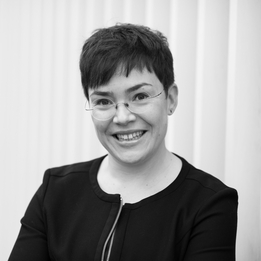Aktuelle Promotionsvorhaben
Esther Bishop

Portrait
After completing a performance diploma as an oboist (2012), Esther Bishop completed a Master’s degree in Communication and Cultural Management at Zeppelin University. She is currently project coordinator for the Toepfer Stiftung gGmbH’s Programme “Lehreⁿ”, where she first designed and implemented a professional development programme for music academics and is currently in charge of the interdisciplinary umbrella programme for universities. Previously, she worked as a consultant to the management of the Deutsche Kammerphilharmonie Bremen (2014–2016). She continues to be active as an oboe player, on accreditation committees of music colleges in Germany and curates concerts in the alternative “classical” music scene.
Dissertation Project
Higher Education of Musicians in Germany:
Teaching Content and Self-Image Under Current Conditions of “Classical” Music
The higher education of aspiring musicians is currently moving between two areas of innovation: On the one hand, there is a growing creative and freelance generation of musicians who create new listening and concert experiences through their artistic approach to formats and traditional works. They place fundamentally new demands on the content of education at conservatoires and are active in other professional contexts than was the case ten years ago. The other area concerns the general higher education reforms of the Bologna Process, which also apply to conservatoires. The PhD project describes an intersection of new requirement profiles of musicians, their implementation on the basis of Bologna principles and the organisational contexts that condition successful implementation. So far, cultural management has not emphasised on the research of educational institutions, and university research, which is also very interdisciplinary, has only marginally touched on conservatoires.
The multifaceted project comprises three individual studies: Firstly, the subjective assessment of artistic music studies was researched in a quantitatively designed graduate study, which specifically surveyed the graduates’ orientation towards a professional field (Bishop and Tröndle 2018). In a second step, all Bachelor’s and Master’s degree programmes in artistic instrumental music at German conservatoires are analysed in the form of an overall survey. Credit points, objectives of the degree programmes and extracurricular, non-musical competences are being surveyed. Of particular interest in the document analysis are the components emphasised as part of the artistic major as well as vocationally field-oriented subjects.
The third part of the doctoral project examines the interface between formal study documents and their meaning in the daily practice of university members. It is assumed that the organisational culture of higher education institutions has an influence on the success of reform projects. The Bologna reforms were accompanied by a standardisation of university structures, although there is evidence of thoroughly heterogeneous informal structures at different university locations. The aim of this third part of the dissertation is to make them visible using the example of study documents and thus to increase the options for the successful implementation of reforms.
Publications
- Bishop, Esther (2015): Was macht den Pionier zum Pionier? Die Differenzierung von organisationalem Wandel und Innovation am Beispiel der Deutschen Kammerphilharmonie Bremen.
- Bishop, Esther / Fink, Lea / Schmitt, Albert (2016): Das Zukunftslabor – Eine Initiative der Deutschen Kammerphilharmonie Bremen. Wie Musik Gesellschaft verändert. In: Birgit Mandel (Hg.), Teilhabeorientierte Kulturvermittlung, Bielefeld: Transcript, 171-186.
- Bishop, Esther / Tröndle, Martin (2018): Tertiary music performance education: An outdated concept of musicianship or artistic education for life?. In: Music and Practice (3).
- Bishop, Esther / Fink, Lea (2017): Klassische Musik im Kulturmanagement, Zeitschrift für Kulturmanagement 2017 (2), 167-183.
- Bishop, Esther / Fink, Lea (2019): Barbara Balba Weber: Entfesselte Klassik. Grenzen öffnen mit künstlerischer Musikvermittlung. Zeitschrift für Kulturmanagement 2019 (2), 225-230.
- Bishop, Esther (2019): Musikstudium... und danach. In: Tröndle, Martin (Hg.) Das Konzert II – Beiträge zum Forschungsfeld der Concert Studies. Bielefeld: Transcript, 333-346.
- Bishop, Esther (2020): Die Förderung junger Klassikmusiker. Eine wissenschaftlich informierte Einleitung. In: Heide Schwarzweller (Hg.) Wegbereiter, Wegbegleiter. Realität Strategien und Wege musikalischer Nachwuchsförderung. Hamburg: Ellert und Richter, 14-18.
- Bishop, Esther (2020): You get what you want, but not what you need. Eine Curriculum-Analyse künstlerisch-instrumentaler Studiengänge. Zeitschrift für Kulturmanagement 2020 (1), 161-194

